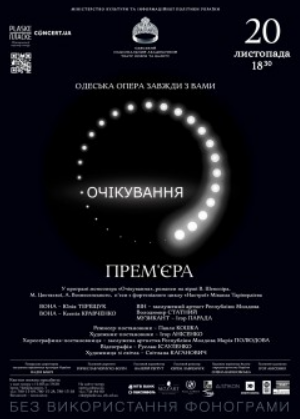Premiere! Mono-opera "Waiting"
Mono-opera "Expectation", romances to verses by Shakespeare, M. Tsvetaeva, Voznesensky, pieces from the piano cycle "Mood" by Mikael Tariverdiev Duration: 1 hour (no intermission) Stage Director - Pavel Koshka Set Designer - Igor Anisenko Choreographer-director - Honored Artist of the Republic of Moldova Maria Polyudova Videography - Ruslan Isaulenko Lighting Designer - Svetlana Kaganovich Composition: She is Yulia Tereshchuk (soprano) She - Ksenia Kravchenko, Tatiana Afanyutina (ballet dancers) He is the Honored Artist of the Republic of Moldova Vladimir State and Honored Artist of Ukraine Serhiy Dotsenko Musician - Igor Parada I must "(Shakespeare's sonnet No. 117) "Reflections" from the piano cycle "Moods" "I love" (to sonnets by W. Shakespeare) "Do not disappear" (poem by A. Voznesensky) "Love is Blind" (to W. Shakespeare's sonnets) "To prevent the unity of two hearts" (in sonnets by W. Shakespeare) "Here is the window again" (verses by M. Tsvetaeva) "My beloved, what have I done to you" (poem by M. Tsvetaeva) "Ice cubes" from the piano cycle "Moods" "An Attempt of Jealousy" (verses by M. Tsvetaeva) Mono-opera "Waiting". Libretto based on the poem by R. Rozhdestvensky "Waiting (woman's monologue)"The music of Mikael Tariverdiev (1931-1996), regardless of the genre, can be recognized from the first bars: be it written in films, opera or ballet performances. The general public knows his work thanks to 132 films, including "The Irony of Fate, or Enjoy Your Bath", "Seventeen Moments of Spring", "The Deer King", and a peculiar manner of performing songs. It was the work on the music for the films that inspired Tariverdiev to create a new musical movement, which he called the "third direction", the essence of which is to convey poetry in an audible and natural voice, if singing using chalk-declamatory techniques. This is how monologues to poems by G. Pozhenyan, recitatives to poems by E. Hemingway, vocal short stories to poems by L. Ashkenazi, monologues to poems by A. Voznesensky appeared. His "serious" music is much less known. However, M. Tariverdiev insisted on his involvement in the academic professional sphere. This is evidenced by his constant appeal to traditional genres of classical music - he is the author of five operas, four ballets, organ music (three organ concerts, 10 chorales "Imitation of the Old Masters", a symphony for organ "Chernobyl"), a piano trio, a cycle of plays for piano "Mood", romances.The composer carried his love for poetry throughout his life, therefore it is not accidental that he turned to the chamber vocal genre. In his work, a special place is occupied by vocal cycles based on the poems of medieval Japanese poets, Shakespeare, V. Mayakovsky, S. Kirsanov, B. Akhmadulina, L. Martynov, G. Pozhenyan, M. Svetlov, E. Evtushenko, E. Hemingway, A. Voznesensky, L. Ashkenazi, M. Tsvetaeva, R. Rozhdestvensky and others. The mono-opera "Expectation" based on Robert Rozhdestvensky's poem "Expectation (a woman's monologue)" (1982) was written specifically for the Chamber Theater of Boris Pokrovsky "counting on the unique talent of Maria Lemesheva," the theater's soloist (daughter of Sergei Lemeshev and Irina Maslennikova). One character acts in the opera - “She” - “a modern woman, wrapped in all the problems, responsibilities and social functions assigned to her by society, and, in truth, he himself (in the former heat of emancipation) comes on a date with his beloved and waits him under the clock. What is going on in her soul for thirty-two minutes of this painful expectation - from passionate ardor to despondency and almost despair - all this is portrayed by Tariverdiev's music with attractive simplicity and truthfulness ”- wrote musicologist Alexander Matusevich. The denouement of the opera is also interpreted differently, because in the score it remains "open". The opera has retained the main characteristics of the text of the poetry of the sixties, however, M. Tariverdiev avoids the poem's jabbering and direct references to urban Soviet life, strives for poetic generalization.Expectations is not like opera in the usual, academic sense of the word. “Perhaps the harmonic language of this opera could have been more tart and rich. But still, I prefer emotional language, "the composer himself wrote about his work. In the music of the opera, the listener will hear both a Soviet pop song of the 1970s, and hits to films of that time - familiar, purely" tariverdiyevsky "turns. consciousness of the heroine, united by the theme of anxious expectation - tremolyuvannya second motive, sounds now in the accompaniment, now in the vocal part.In separate scenes-stanzas, genres of ancient music are recognized: toccata (episode "Ambulance" with disturbing rehearsals in accompaniment), baroque aria (" Tell me something ”, the instrumental finale - allusions to the music of Bach, elements of the musical language of D. Shostakovich are heard. Since its premiere, the opera has taken a worthy place in the repertoire of many theaters and is presented both in symphonic sound and in a semi-concert performance under the piano.
